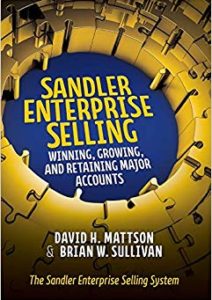In the world of enterprise selling, the simple fact is that losing happens. Regardless of your best efforts to maximize your likelihood of success, you will fall short on occasion.
And in the midst of the grief after losing a major deal, someone will invariably say, “We should learn from this to make sure it doesn’t happen again”. A very logical idea, of course, gaining lessons learned from a loss. It’s amazing, though, that some of the most sophisticated enterprise selling organizations do a lousy job of performing post-mortems. Meetings that assemble selling team members to review the details of failed pursuits are frequent failures themselves. Such sessions often involve the conflict of finger-pointing, the consolation of group hugs or both. Sooner or later, typically after twenty minutes or so, someone ends the session by saying “Let’s just go win the next one!”. Which leaves us to wonder, why is it so difficult to review the details of a loss? Truthfully, the answer lies in human nature.
Think about it. Every major city has a publication that annually celebrates the top local physicians – the best pediatricians, neurologists, dermatologists, etc. But what about the best coroners? Do they ever get recognition? Of course not, regardless of their clear value. Why not? Because they deal with the after-effects of a loss – the autopsy. Regardless of how valuable the lessons learned are, it’s a people problem. We’d rather not dwell on it. We look away. And we focus elsewhere – “Let’s go win the next one!”.
Powerful emotional factors aside, there’s another practical reason why selling organizations are so bad at doing post-mortems. Why? Because they have no frameworks to follow. We all know people who plan their own funerals but, truthfully, they’re few and far between. But that planning, macabre as it may seem, sets the stage for very organized send-offs. Frameworks do the same for post-mortems – frameworks built long before deals are won or lost. The process starts with having an effective Go/No-Go process to help you identify the deals with the highest probability of success. Your ability to target and pursue only these true “profile” deals is fundamental. But how do you build such a capability?
You begin with a candid assessment of what your organization does well and not so well, combined with a clear picture of what exactly a profile opportunity is in your world. This powerful pairing must be baked into the marrow of your organization, providing the baseline for your customized Go/No-Go framework. In Sandler Enterprise Selling, we use the Pursuit Navigator framework, which breaks down an opportunity issue into three categories – Client Issues, Selling Team Issues, and Finance/Contract Issues. Utilizing team selling, individuals from across the organization evaluate the issues. This “Deal Forum” facilitates the collaboration that determines your levels of stability or risk with each issue. For example, do you have account relationships at multiple levels? Do you understand your competition, their value propositions, and their relationships? What about the contract? Are there stipulated guarantees, warranties or penalties and do you understand their consequences? Think about these questions and others. How could you not evaluate them? Why would you ever proceed without clearly understanding their implications?
If you’re stable with an issue, you check the box and move on. But where you’ve identified risk, the question is what to do about it – what action to take. Building practical, workable mitigation plans to quickly address risks is critical. No good can come from delays on risky issues. The clock is always ticking in major pursuits.
The results of your mitigation efforts provide perspective, knowledge, and clarity, feeding your Go/No-Go framework. And if the decision is made to proceed on an opportunity, with risks mitigated as effectively as possible, your due diligence increases your chances of winning. But nothing is guaranteed. In the world of major pursuits, losing happens. Which takes us back to the coroner and the Go/No-Go framework that supported your decision to move forward. For after a loss, that framework is staring you in the face. That’s right. It’s also your post-mortem template.
Remember those business issues you reviewed to identify and mitigate risk? You missed something. Maybe you miscalculated an impact, ignored a dependency or gave yourself some undeserved benefit of the doubt. In any case, the information that drove your decision to proceed was clear. And reviewing it now teaches you lessons to help you avoid making the same mistakes again.
With major account pursuits, sound Go/No-Go decision-making is a survival skill. It not only helps you determine which deals to pursue but it provides valuable insights from losses.
Enterprise selling – you win or you learn!



Comments (5)
An Insightful writeup about marketing…… I have learnt about enterprise selling
An excellent write up that sums up how to manage loses in an organization. it is indeed insightful and I find it educative.
Enterprise selling, You win or you learn. What an excellent piece for marketing
He who is afraid of failure can not handle the pride of success. Failure is part and parcel of any business but that doesn’t mean that every business should record failure intermittently as a matter of fact, it takes only one huge failure to permanently terminate the hereditary of failure thereby bringing to light good decision making. What fuels failure is poor decision making. The after effect of failure is very important because that will determine how fast your next big win will occur. If you feel hopeless, sad and frustrated after failure then you are shortsighted because anytime failure really occurs success is in view.
I’m always scared of losing, now with this information I can be more courageous to accept my past failures as a stepping stone to achieving greater success. Thank you.